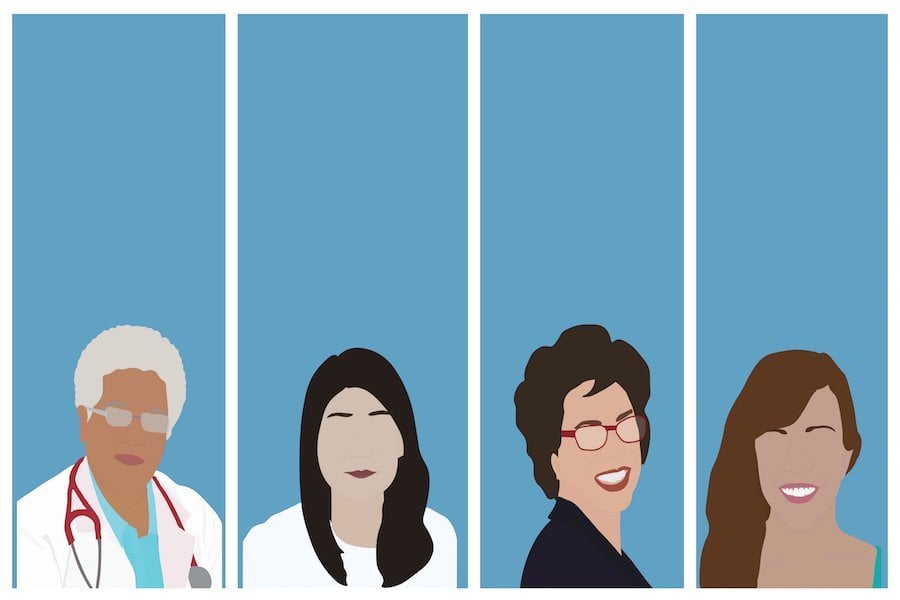Second Baptist Church webinar addresses Black wellness, resiliency amid pandemic
Daily file illustration by Isabel Gitten
Local Black medical professionals addressed vaccine hesitancy among the Black community and encouraged community members to get vaccinated at a webinar Monday hosted by Evanston’s Second Baptist Church in partnership with AMITA Saint Francis Hospital Evanston.
February 16, 2021
AMITA Health gynecologist Riley Lloyd emphasized the importance of building Black community amid the pandemic Monday night.
“What helps our community is when we’re better neighbors,” Lloyd said. “We tend to run away from (mental health)…we’re going to have to reach out more and face those demons and bring people in.”
Lloyd was joined by four local Black medical professionals at the “Bridging the Gaps: Black Health and the COVID-19 Vaccine” event, hosted by Evanston’s Second Baptist Church (SBC) and AMITA Saint Francis Hospital Evanston.
SBC senior pastor Rev. Dr. Michael Nabors and Kenneth Jones, Saint Francis Hospital’s chief executive officer moderated a conversation about the state of COVID-19 and the role of the vaccine.
Richard Phillips, regional medical director of Illinois Emergency Medicine Specialists and medical director for AMITA Health’s emergency department, stressed how sick the virus makes people. He recalled his first COVID-19 patient — a 20-year-old Black man — was in the hospital for five weeks even though he had been relatively healthy prior to his diagnosis.
“If all 100 people on this webinar were to get COVID-19, about 20 require hospitalization, which is significant,” Phillips said.
While COVID-19’s effects differ from patient to patient, he told viewers it is “not just like the flu,” and can produce substantial health consequences.
According to Phillips, COVID-19’s mortality rate is approximately 50 percent higher for Black people compared to White people.
NorthShore University HealthSystem pharmacy resident Nathaniel Johnson proceeded to present information about the Pfizer and Moderna vaccines to viewers.
Johnson said the two trials used to test the vaccines included about 30,000 individuals, 10 percent of whom were Black. The Moderna vaccine has an efficacy rate of 94.1 percent, and the Pfizer vaccine has an efficacy rate of 95 percent.
According to Johnson, both vaccines have proven to be very effective and relatively safe. He said common adverse reactions observed in the trials include injection site pain, fatigue, and headache.
Barrett Robinson, a NorthShore maternal fetal medicine physician treating high risk pregnancies, said while pregnant individuals were excluded from vaccine trials, he encourages them to receive the vaccine, especially if they work in high-risk situations.
“There’s nothing about the technology that has raised any concerns in terms of giving it to a pregnant patient,” Robinson said.
Panelists said it is important to address deeply rooted and continuous implicit racism in medicine.
To prioritize wellness in Black communities, Lloyd recommended individuals get seven hours of sleep a night and take Vitamin D supplements, which help in cellular reactions throughout the body. The AMITA Health gynecologist said individuals can determine their optimal dosage based on deficiencies present in a simple blood test.
Nabors emphasized the role Black community leaders and pastors can play in raising awareness about wellness in the Black community. He also noted the impact structural racism has on mental health.
“Being born Black creates a stress that is uncommon and not natural among other people,” Nabors said.
Phillips said an expert is set to speak with his team this April to teach equitable strategies. The regional medical director of Illinois Emergency Medicine Specialists is optimistic about the role of the COVID-19 vaccine in improving Black health.
“I’m looking forward to seeing a better day in the future,” Phillips said. “I think what we can give people is hope, and that’s what the vaccine is. It’s hope.”
Email: [email protected]
Twitter: @JorjaSiemons
Related Stories:
— Illinois to expand vaccine rollout to residents with pre-existing conditions on Feb. 25
— As vaccine hesitancy threatens to increase COVID-19 disparities, local experts try to build trust
— Josselyn Center hosts free Mental Health First Aid training for Evanston residents


